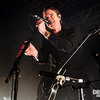A few weeks ago, DiS' Editor picked up the new Electronic magazine. Predictably, he really liked it. Especially because it had a brilliant feature by hero-to-many Neil Kulkarni about Twin Shadow, the maker of one of our albums of 2012. A few emails later and we're very proud to present the piece to give you all a taste of the magazine to coincide with the launch of the digital/tablet/smartphone version of the magazine.
---
WIN
Before we get to the feature, here's a special competition... We have the following prizes to give away to one lucky winner to celebrate the launch of Electronic magazine:
Prizes:
- Robert Hood – Motor: Nighttime World 3 (Music Man): The Detroit techno legend presents the latest album in his ‘Nighttime World’ series.
- Mark Stewart – The Politics Of Envy (Future Noise Music): The acclaimed new album, including the new single ‘Stereotype’, featuring Factory Floor.
- Grasscut – Unearth (Ninja Tune): Quality electronica with a dash of pyscho-geography and a guest appearance by Robert Wyatt.
- Outer Space – II (Blast First Petite): The second offering in a trilogy of releases from John Elliot of Emeralds.
- Minny Pops – Standstill To Motion (LTM Recordings): A live CD/DVD package recorded in Amsterdam and New York in 1981.
- The Gaslamp Killer – Breakthrough (Brainfeeder): The debut album from the much admired LA turntablist and founder of the Low End Theory club.
- Kid Koala – 12 Bit Blues (Ninja Tune): Further proof that Eric San is one of the most innovative beatmasters around.
- Purity Ring – Belispeak 12-inch (4AD): A limited edition 12-inch of one of the highlights of the band’s excellent debut album ‘Shrines’.
- Blood Diamonds (featuring Grimes) – Phone Sex 12-inch (4AD): Grimes hooks up with her old pal Mike Tucker for this steel drum-driven electro fizzer.
- Backstage: A Book Of Reflections (Gary Numan book) by Stephen Roper: A fascinating book about Gary Numan focussing on the years 1979-81, when Numan was at the peak of his commercial success.
To enter, simply comment below the feature telling us:
If you were to make a Now That's What I Call Electronic Music... compilation album, what three tracks would have to be on there?
The competition will close and the winner of this bag of swag will be picked by DiS' editor at midday on Friday 28th September 2012.
---
CONFESSIONS OF A POP MAVERICK
George Lewis Jr, aka TWIN SHADOW, has produced one of the most innovative and intriguing collections of high-tech pop songs you’ll hear all year. The fella’s got a mighty fine moustache, too. Words: NEIL KULKARNI
“Oh hi, I’m in LA, aren’t I?” says the somewhat sleepy afternoon voice down the line.
Yup, you are.
“Sorry, I’m still on Brooklyn time. Can we do this another time? I’ve got too much running around to do today.”
Turns out he’s hanging out with Jessica Alba. I see no reason why the chance to meet up with the fragrant Ms Alba should come ahead of speaking to the squalid likes of me, but as excuses go for blowing out an interview it’s a good one. When I do finally get to speak to George Lewis Jr, aka Twin Shadow, I’m feeling somewhat slighted (Jessica Alba is a massive fan and they were meeting to discuss her appearing in a Twin Shadow video), so good job he’s a total charmer and good job his new album, Confess, is one of the sparkliest, most moving pop gems 2012 will give us.
You might have heard Twin Shadow’s debut opus, Forget. It crept out in 2010 under the aegis of Grizzly Bear’s Chris Taylor, who signed Lewis to his new label, Terrible Records, after hearing a bedroom-born demo tape. 4AD did the smart thing and snapped Twin Shadow up worldwide.
Created in Lewis’s bedroom and in Taylor’s studio over the course of three years, Forget was a joy, a shimmering combo of sucker punch beats and frabjous funky detail. Rare amidst hipster reimaginings of the 80s, it seemed genuinely enamoured and enraptured with vintage textures, and hung together as an album length suite of pop perfection, the kind of meticulous melange of moments of pure bliss you thought had absconded last time Eno and Talking Heads stopped working together. That such gorgeous, addictive music was wrapped around songs that packed real suggestiveness, twisting heart-rending emotion and teasing lyrical ambiguity into stunning three-minute blasts to the soul, made Twin Shadow a uniquely fully-formed proposition but curiously placeless, sounding like the greatest music on earth seemingly beamed in from nowhere. Otherwise known as Dominica, Florida, Brooklyn, Boston, Berlin, Copenhagen, London…
“I am all over the place mentally,” admits Lewis. “I was born in Dominica to a black mother and a white father. From the beginning, I’ve learned that my identity is up to me, that I can put together what I want, from anywhere, to create that identity.”
Born between cultures, it’s clear that Lewis’s musical agility and mental slipperiness reflects his own sense of geographical displacement.
“Early on in my life, we moved to Florida. First Miami, then when the crime got too bad in the neighbourhood we lived in, to Venice. Venice was a strange place. It was kind of like living in an old people’s home. Hardly any kids about. In one direction, the ocean, the beach. Lots and lots of old, old people. In the other direction, swamps, thick jungle, crocodiles. Lots and lots of crocodiles. It was perhaps inevitable that I would emerge from this somewhat mixed up.”
What kind of music were you listening to early on?
“Hip hop, R&B, the kind of music I occasionally heard in Miami, the music my twin sister introduced to me. In Venice, I heard it less from the street and more from the radio. I’d make tapes of my favourite songs. Those years will always exert a big influence on my music. Hip hop and R&B was the first music I heard that really got me into sound and how it causes pleasure.”
You can hear that eduction in the rubbery bass noises and peach-perfect beats of Forget. Twin Shadow’s music never plays at being funky, or jokily takes on black influences. It’s as bumptious in your trunktious as the fullest phat old skool.
“But then, in ‘92, I hear Nirvana. I see a video of the Sex Pistols. And my whole life changes. My parents drag a guitar down from the attic and I start learning. I become obsessed with the band Morphine. So dark, so gloomy, it seems to suit my life and my mood, ‘cos I’m an angry teenager, a lovelorn teenager. With this obsession, I move to Boston, with the ambition to basically be in a punk rock band, which I do. When that doesn’t work out, I move to Brooklyn.”
Why?
“For love. To follow a girl. A girl, it turns out, who doesn’t want me following her. This is often the case for me. I chase love anywhere. Love has disappointed me a lot of times.”
Is it in Brooklyn that you start writing the songs that would become the output of Twin Shadow?
“Nope, there’s a few more places that change me around first. I start touring with this dance troupe, creating music for them. We tour the world, I end up falling in love with Europe, with European music, with Copenhagen, but most importantly, with Berlin. Then I return to Brooklyn and start making Twin Shadow happen.”
---
---
Of course. Had to be Berlin. Forget carried a powerful Eno/Bowie influence (and hints of The Walker Brothers’ unforgettable Nite Flights), not just in the dramatic vocals and shuddering electronic undertow, but in a deeper structural sense too. Like Eno, Twin Shadow realises that the true power of recording is in the ability to isolate moments, accidental moments of pure sonic pleasure, and repeat them, space them, arrange them in a lattice of bliss. Could be the tiniest thing, a nagging little shard of guitar, a surprising melodic backflip on the bass, some earworm piece of percussion: both Forget and Confess find those moments and milk them for maximum pleasure. Although, to Lewis’s credit he denies the conceptual nature of Eno’s work, whilst accepting the influence.
“Definitely those records had an effect, just like The Smiths and other European bands and artists started exerting an influence on me, but I don’t buy Eno’s explanation of what makes recording work. Music is one of those things that people can theorise, talk about, conjecture about, write about forever…”
I hope so man, or I’m out of a job…
“Sure! But really, when it comes down to it, none of those theories will help you make music, or make music that comes from yourself. They’re just ways of thinking about music after the event.”
So where does your music come from? Is it painstakingly worked out or does it just appear in your head all of a sudden?
“You spend a lot of time just getting to that point where a melody can occur to you. And then you spend a lot of time making sure that the song comes across. To me, music is a divine thing, it’s a mystery, it’s magical, and I don’t like talking about it too much…“
Because you don’t want to demystify it? I’m wondering if these thoughts of the “divine” come from the Baptist churches he was exposed to growing up in the Bible Belt.
“No, because those people believe in God. Not that there’s anything wrong with that, but when you see those people, their eyes, they feel that music is absolutely given to them by God, who is real. For those of us who are less convinced about that… When I say ‘divine’, I really mean it’s magical. It’s mystical. It’s from a place we can’t explain.”
I’m still gonna try and explain it. I’ve got to admit, initially I balked at Twin Shadow. Superficial as I am, I saw the moustache, the bouffant hair, read too many people talking about too many hipster reference points and put him down as some kind of Transatlantic Shoreditch/Nathan Barley vision of pop, an amalgamation of influences rather than art. Then, as it was with Telepathe, I heard George Lewis Jr and all that changed. For starters, what an astonishingly accomplished, mind-on-pleasure accumulation this was, but crucially the words Lewis wove around his music were impossibly moving, richly suggestive. These were great songs, about redemption, about the unanswerable questions of life becoming a way of life, about making uncertainty into a liveable existence.
---
---
Confess takes Lewis’s songwriting to new levels of intrigue and possibility. Taking Forget out on the road with a band for the past few years has sharpened the writing and production, made the looseness more organic, the tightness more concise. Sonically, he’s also moved on from the late 70s textures of Forget. A heavy, heavy Arthur Russell/Prince vibe I’m feeling on Confess, George…
“To a massive extent, those two guys, who wanted always to make pop, have already inhabited my vision of the ideal artistic environment. Prince and Arthur Russell had this ability to just retreat into a magical world of sonics where they rule. They’re a big influence on me.
“On this album, I wanted things to be a little less 'perfect’ than Forget. I was sick of that perfect, dry Linn drum sound, so I used more live drums. I wanted things to feel more organic, more imperfect, have more feel. Even though I recorded the album completely by myself, and played everything, I was definitely heavily influenced by the experience of playing live with a band, the need you develop to stop playing now and then, to leave spaces, and experimenting with new equipment helped me in that. I think people were expecting me to make a more ‘live’, ‘rocky’ record. It’s actually even more isolated and private than anything I’ve done before.”
Are you also now finally in love with your voice? Where on Forget it was definitely a part of the mix, on Confess it seems more strident, more multi-tracked, more at the forefront.
“Nobody loves the sound of their own voice, except maybe Stevie Nicks and she deserves to! No, I hate the sound of my own voice, but I do know it’s the most important instrument there is. It’s the thing that gives you an emotional connection, and it can do things no other instrument can, and coming back to what I said earlier, it’s the element of music that is most free of analysis. Hate my voice, love playing with it!”
Are the album titles imprecations to a lover, or to yourself? In fact, are all your songs addressed to someone else, or to yourself?
“The album titles are definitely addressed to me. In the case of Forget, it was about letting go of pain. Love has hurt me a lot. The lyrics to Forget were sometimes addressed to a lover, sometimes to me, sometimes from the mouths of characters I loved in films, sometimes real. Confess is about the passage of time, but about the capturing of joy in the face of disaster.”
Did you feel pressure to create something the band could play, now that Twin Shadow isn’t just a bedroom proposition, but a touring outfit? Did you feel the pressure of audience expectation, now that you actually have an audience and you’re not just making this music for yourself?
“To be honest, I felt more pressure from friends. ‘Are you sure you want to make another record now?’, ‘Are you sure it’s going to be as good as Forget?, ‘Are you sure you’re not gonna blow it?’. They made me feel majorly pressured, but when I’m recording, when I’m writing, I am entirely off in my own world. This music is important to me because without it I wouldn’t be able to live, I wouldn’t know how to live…“
What do you mean?
“What I mean is that these songs are my Bible. They’re my manual as to how to exist. In my life, lovers have disappointed me, people have disappointed me, bands have disappointed me. But like Bob Marley said, when music hits you, you feel no pain. That profound sense of feeling that music gives you, I wouldn’t be alive without it because it’s a way of sharing emotion with yourself in a way that you’d never do just through thinking or writing or painting or any other art form. Music turns pain into joy.”
Pain? Yesterday he lunched with Jessica Alba. George Lewis Jr is a true maverick, and on the evidence of Forget and Confess, a star we scarcely deserve.
“My mind is filled with words. My heart is full of love. This is where I want to be. I want to stay here, and I want to tell you everything.”
Start listening to Twin Shadow as soon as you can. Pop just found itself redemption.
Confess is out now on 4AD
Electronic magazine is now available in all good newsagents. You can download it to your Smartphone and Tablet via the Future Music and Computer Music. Here's a mini sampler of the magazine:






















